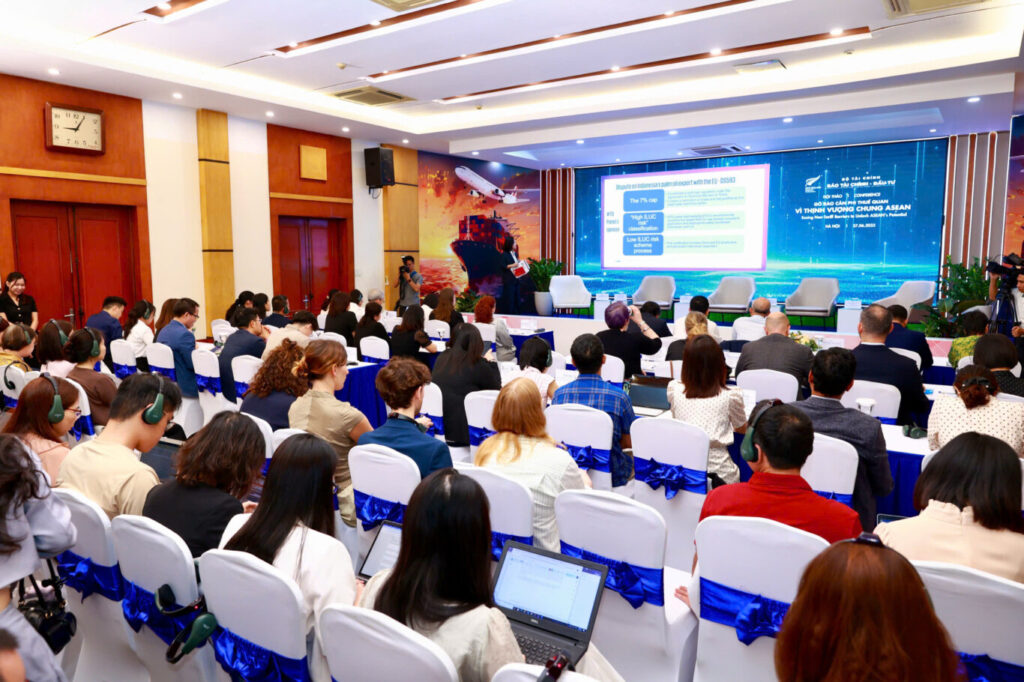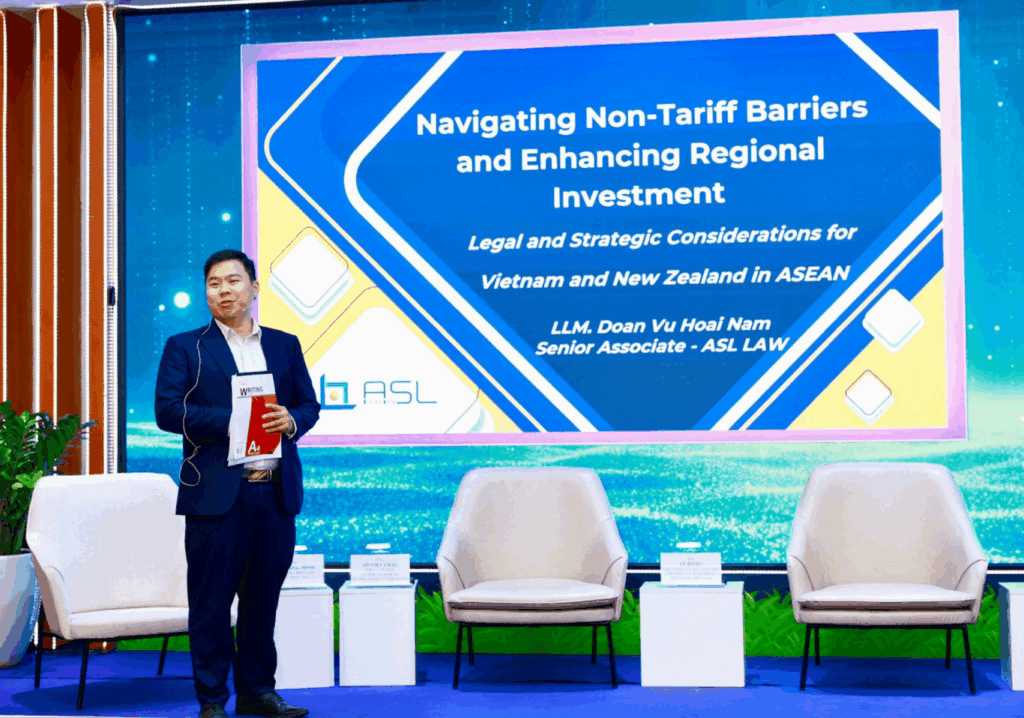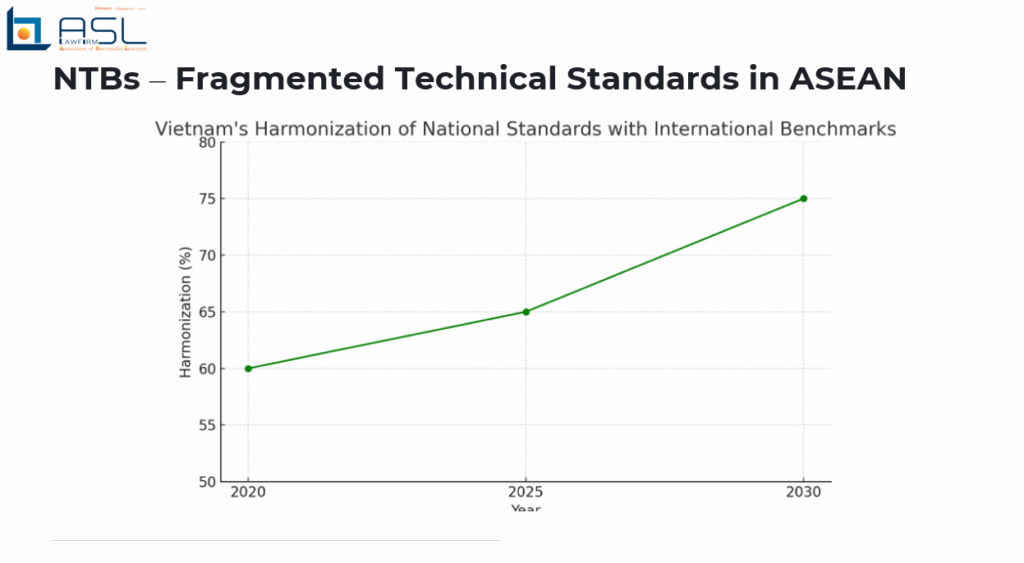At the Vietnam Investment Review Building, LLM. Doan Vu Hoai Nam, ASL LAW’s Senior Associate has had had the opportunity to speak on the topic: “Eliminating Non-Tariff Barriers for Shared ASEAN Prosperity.” Lawyer Doan presented ASL LAW’s legal perspectives on how regulatory barriers – though less visible than tariffs – continue to impact the flow of goods, services, and investment in the region.


1. ASEAN Integration and the Rise of Non-Tariff Barriers
As ASEAN continues to deepen economic integration, non-tariff barriers (NTBs) have emerged as one of the most persistent and complex challenges for businesses across the region. While tariff reductions under various ASEAN trade frameworks have largely succeeded, a parallel trend has become increasingly evident: non-tariff measures (NTMs) are evolving into NTBs that distort trade, hamper investment, and disrupt supply chains.

NTBs today are more than just bureaucratic red tape—they actively shape how companies structure their operations, select investment destinations, and manage cross-border supply chains. Strategic navigation of NTBs is thus critical, especially for partnerships between ASEAN members like Vietnam and strategic external partners such as New Zealand.
2. Key Legal Challenges of NTBs in ASEAN
NTBs in ASEAN manifest through a wide range of legal and regulatory complexities. These include the fragmentation of technical standards, where each country applies different rules for product safety and quality, and complex market access requirements, such as foreign ownership restrictions and joint venture mandates.

Cumbersome administrative procedures related to customs clearance, construction permits, and environmental licensing are also common, as is the inconsistent enforcement of national laws across local jurisdictions. Together, these challenges create significant uncertainty and raise compliance costs for businesses and investors throughout the region.
3. Regulatory Fragmentation – A Barrier to Seamless Integration
One of the most significant NTBs in ASEAN is the lack of harmonized technical standards. Each member country maintains its own product safety rules, environmental regulations, and certification systems. This regulatory fragmentation creates burdens for businesses operating across multiple jurisdictions, as they must adapt their models, infrastructure, and documentation to meet inconsistent standards.

Vietnam, however, has made notable efforts in this area. Around 60% of its national standards (TCVNs) have been harmonized with ISO/IEC norms, and the country has aligned its regulatory framework with the WTO’s Technical Barriers to Trade (TBT) Agreement. Vietnam also participates actively in 81 ISO/IEC technical committees and has adopted the GS1 barcode system with the code 893, supporting product traceability and trade facilitation.
4. Case Study: Indonesia – Chicken Import Restrictions (WTO DS484)
The WTO dispute between Brazil and Indonesia over poultry imports illustrates how NTBs can constitute trade violations. The panel concluded that Indonesia had breached the WTO’s Sanitary and Phytosanitary (SPS) Agreement by imposing undue delays in Brazil’s poultry import application process. These delays included requiring Brazil to complete a non-SPS-related questionnaire and failing to give its application priority.

The panel also found Indonesia in violation of GATT 1994. The positive list requirement effectively acted as a de facto import ban, breaching Article XI:1. The intended use requirement imposed additional restrictions on imported chicken, resulting in less favorable treatment than that granted to domestic products, thereby violating Article III:4. The rigid application windows and fixed validity periods under the import licensing system further restricted market access, also in breach of Article XI:1.

Indonesia’s attempt to justify these measures under GATT Article XX, including public health protection and ensuring compliance with domestic laws, was rejected. The WTO ruled that the measures were unjustified, discriminatory, and not in conformity with core WTO principles. As a result, Indonesia was required to bring its legal framework into compliance.
5. Vietnam’s Legal Reforms – Moving in the Right Direction
Vietnam has made significant progress in improving its regulatory framework to reduce NTBs. Amendments to the Law on Investment and the Law on Public–Private Partnership (PPP) have enhanced legal clarity for investors, while Resolutions 68/2020 and 02/2021 have focused on reducing compliance burdens and streamlining administrative procedures.

The implementation of the National Single Window has helped accelerate customs clearance and inter-agency coordination. In parallel, Vietnam continues to harmonize its technical standards with ISO/IEC norms and deepen its commitment to the WTO TBT Agreement.
6. Areas for Further Improvement in Vietnam
Despite the progress, several areas still require reform. Investment licensing procedures remain complex and should be further simplified and digitized to enhance efficiency and transparency. The inconsistent enforcement of laws across provinces undermines investor confidence and needs to be addressed through better central-local coordination.

In addition, Vietnam should streamline customs and visa processes for foreign professionals to support cross-border operations. The modernization of sanitary and phytosanitary (SPS) procedures and technical barrier regimes is also essential to meet international standards. Finally, establishing robust public–private dialogue mechanisms will ensure that reforms are responsive to real business concerns.
7. Opportunities for Vietnam–New Zealand Cooperation
ASEAN’s integration agenda depends on resolving NTBs and building a transparent, rules-based regional trade environment. Vietnam’s recent reforms signal a clear policy shift toward this goal, with substantial advances in harmonizing standards, simplifying procedures, and aligning with WTO rules.

For New Zealand businesses, these developments create favorable conditions to expand investment, form strategic alliances, and co-develop sustainable solutions in sectors such as clean energy, education, infrastructure, and the digital economy. Continued cooperation between Vietnam and New Zealand will be vital in unlocking ASEAN’s full economic potential and building a resilient regional future.
ASL Law is a leading full-service and independent Vietnamese law firm made up of experienced and talented lawyers. ASL Law is ranked as the top tier Law Firm in Vietnam by Legal500, Asia Law, WTR, and Asia Business Law Journal. Based in both Hanoi and Ho Chi Minh City in Vietnam, the firm’s main purpose is to provide the most practical, efficient and lawful advice to its domestic and international clients. If we can be of assistance, please email to [email protected].
ASL LAW is the top-tier Vietnam law firm for tax law consulting service. If you need any advice, please contact us for further information or collaboration.

 Tiếng Việt
Tiếng Việt 中文 (中国)
中文 (中国) 日本語
日本語

